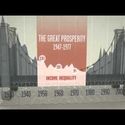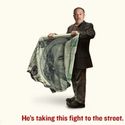Movie Review
Inequality For All
September 26, 2013
The “Schoolhouse Rock” on the Economy, INEQUALITY FOR ALL is a “Must See” for every American.
With few exceptions, each of us has been affected by the financial collapse of America in 2008 and the resulting “Great Recession.” But how many of us actually understand “how” this could happen not only to America, but to each of us? We work hard, save a little, spend a little (or in some cases, save a lot, spend a lot). We go along our daily lives like good worker bees as we’ve been taught by our parents and their parents, many of whom survived the Great Depression. But something broke within the system and there is now little to no saving or spending but for the top 1% of earners in the country. So, what happened? And this is exactly the kernel that was planted within director Jacob Kornbluth when he got the idea for a documentary on the subject tailored for the average American.
“I had in my mind this sense of somebody without an economic background and that I was a perfect first audience for this stuff. If I could get it, maybe everybody else could get it. I realized in the bigger economy, I had been sort of trapped in the 24 hour news cycle. I kept hearing people discuss income and equality and what was happening to the economy after the crash in 2008 and I didn’t understand what was going on. I didn’t get it. I was frustrated with that. . . I didn’t understand what had happened. I didn’t have any context for it. So, I was hoping to do some sort of story to put all of this in context.” Reading “Aftershock” by Robert Reich changed everything for Kornbluth. “[It] was just like paradigm shifting for me. I hadn’t thought about it in that way. I didn’t realize that this widening income equality was affecting our economy and our democracy. I had understood it maybe in moral terms coming into that. I had understood that maybe it just wasn’t fair that people had this amount and everybody else had that little, but now I had a new framework to understand it. It was bad for our economy overall and it was bad for our democracy.” And so Kornbluth went to Robert Reich.
Considered to be one of the foremost experts on economic policy, former Secretary of Labor to President Clinton, cabinet member for Presidents Carter and Ford, author of 14 books and currently Professor of Public Policy/Wealth & Economics Berkeley, Robert Reich is the teacher, guide and hero in INEQUALITY FOR ALL; the teacher that we all wish we had had and thanks to documentarian Jacob Kornbluth, we now do have. As Kornbluth himself puts it, “This is the class I wish I could have taken in college and from the teacher I could have taken it from.”
With few exceptions, each of us has been affected by the financial collapse of America in 2008 and while the government and other powers-that-be reiterate ad nauseam that the economy has recovered, is recovered, jobs are returning, unemployment is dropping, yet the average American doesn’t see this great upward swing in our individual lives. For those that are employed, you’re working more but in many cases, earning less. Sometimes two and three jobs are juggled just to keep a roof over our heads and food on the table. There is no room for “extras”.
The spending middle class that once drove the US economy to great heights over the past 35 years is stagnating. The US economy has more than doubled during this time period yet middle class incomes have become log-jammed in a holding pattern or even worse, dropped exponentially. In 1970, the top 1% of wage earners took home 9% of the income. Now, that top 1% earns approximately 23% of the income in this country and holds more than 35% of America’s overall wealth. The bottom 50% of wage earners, i.e., most of us, controls only 2.5% of the nation’s wealth. When the middle class has to tighten its belts, the whole economy suffers. And with 70% of the US population falling into “middle class” status, there is no amount of spending by the top 1% of earners or “upper class” to compensate for the shortfall. The last time we saw this inequality of income and wealth was just prior to the Great Depression. So, how did we let ourselves becomes trapped into another case of history repeating itself? And more importantly, how do we deal with the current income disparity and inequality and the ever widening gap of wealth? The first thing, is to understand our economic history and its economic imbalance and how that ties to democracy as a whole. And no one makes the issue more comprehensible than Robert Reich.
According to Reich, “[In “Aftershock”] I did summarize what I thought had happened to the economy over the past 30 years and how widening inequality had a roll to play in the financial crisis and we would still be struggling to get out of the gravitational pull of the Great Recession because of it. Jake did something that I didn’t think was possible and that was to put it into terms in movie language and art form that the audiences have found incredibly powerful.”
With a finely tuned and engaging balance of intellectual discussions, animation and graphics, history lessons, some humor, and intimate personal moments getting to know not only Reich but “Average Joes” from the bottom of the economic ladder all the way up to a corporate CEO, Kornbluth and Reich deliver a documentary in a style best described as “information visualization”, with easy to understand charts, analogies and dialogue that is more than attention grabbing. It’s mesmerizing.
The more you listen to Reich speak, the more you understand why his lecture hall is full and his students are actually looking at him and looking engaged as opposed to what you normally see - napping and/or doodling in lecture. He is passionate and impassioned and cares deeply about his students and this country. The engaging affability and charm which we see in the collegiate setting is genuine and it is through meeting some of his students and learning about their own personal lives and economic struggles that INEQUALITY FOR ALL resonates even louder with the movie-going audience .
Reich may consider himself small in stature (Reich is 4'10") but sits tall in the saddle, speaking volumes and packing a punch with every word. His analysis of the issues is clear-cut and easy to understand for the layman. His enthusiasm, passion and frustration at the current economic situation and inequality of earnings vs labor force is both palpable and tangible. Providing glimpses into his own personal and professional background, his credentials and expertise are easily and effortlessly established in a casual matter of fact manner as opposed to beating us over the head with why he is who he is. Personally, I could listen to Reich speak for hours on the subject of US economic history and labor.
When it comes to the film’s construct, editing is sharp and concise with an easy-going flow, matching Reich's knowledge and teaching. The animation and animated charts with the bridge analogies are brilliant visual aids, serving as a useful tool to those that need pictures to assimilate information. Kornbluth himself refers to the animation and “information visualization” techniques as his “aha moment” for the INEQUALITY FOR ALL. “At the beginning of [Reich’s] book is this graph and it has 1928 and 2007 and it looked to me so clearly like a suspension bridge. I was like, ‘My goodness gracious. Is it really that clear? That just before the two biggest crashes of this century was the most concentrated income in the hands of the 1%?’ When I saw that I had to know more. I knew that there was enough in there that was intriguing to me that I really wanted to sort of understand it more but it was the initial visual “aha” that made the movie make sense to me.”
There is so much information for Reich and Kornbluth to impart on the issue at hand, that this could be an entire series for PBS, YouTube or dare we say it, respected news outlets. The judicious selection of informational topics and impactful subject areas addressed in the context of INEQUALITY FOR ALL is very well thought out, providing the basic philosophy and necessity of unions, big business, entrepreneurs and even the little guy at Costco. Like an underground root system that drinks in water and nutrients from the soil, each is an integral part of the root system of America’s economy.
Bringing the documentary full circle, Kornbluth and Reich provide a cogent and comprehensible chronology which is easily explained by Reich, ultimately tying in the legislative and judicial systems and leading us to the steps of the United States Supreme Court. Key is that we so easily and so often forget that when our forefathers structured this country and its democratic processes, they were very prescient and careful in the dividing of power and the structure of the populous. And through Reich's confident and clear explanations, everything is easy to understand. There is a wonderful flow to the film showing the hand-in-hand relationship of politics, economics, Wall Street, the law, fiscal cliffs, etc., with all the dots being connected in an easy to understand and engaging manner.
Significant is that INEQUALITY FOR ALL isn’t a soapbox for blame. As Reich states, “It’s not a blame game. . .If you want to understand what’s been going on and also what needs to be done, you’ve got to get out of the blame game. Some people on the left want to blame the rich and corporations. Some people on the right want to blame the poor and government. Either of those frames referenced get you nowhere; and they aren’t even truthful. You’ve got understand the dynamic itself - How we got into the position? Why is it that globalization and technological change have not had nearly the same affects of pulling societies apart, of creating massive inequality and economic insecurity elsewhere? - It’s a failure of understanding that we can change the rules of the game and have a much more prosperous society overall. This is not a zero sum game in which the only way the middle class and the poor gain is if the rich lose. The rich will be better off with a smaller share of a rapidly growing economy and a less vitriolic society than they are now.”
A documentary that is as valuable today as it was yesterday and will be tomorrow, as Kornbluth puts it, “I think in a certain way, it’s not an ‘of just this moment’ this film. I feel like it’s not pinned to just one news cycle. I feel like it will be useful to people to see next year and it would have been interesting for them to see it last year. I feel like it’s one of those stories that’s a little bit bigger and a little bit less pinned to one time.” On viewing INEQUALITY FOR ALL, some may ask, “Why now? Why not make this film before the 2008 collapse?” In Reich’s sage eyes, now is the perfect time. “ I think it’s very important for people as we come out of the crisis that was the financial crisis of 2008/2009; it’s dawning on people that there’s something fundamentally wrong with the economy. . .I think that if this movie had come out during the financial crisis, everybody would be focused on Wall Street and the financial crisis. I think now is the perfect time as we come out of the recession when the realization is dawning on people that there is something more fundamental going on that we can actually teach.”
With INEQUALITY FOR ALL, Jacob Kornbluth and Robert Reich cut through the crap with rapier clarity, opening a wide path of comprehension. While the documentary and Reich himself may not have all of the answers to the middle class economic crisis and the economic inequalities facing us, he is asking not only the questions we should all be asking, but asking the right questions. As Kornbluth notes, “If we want to have an America that sort of works for everybody and that’s good for us and good for all of our citizens, we need to fix this. It’s an imperative that we do something about it.” The key to fixing is by understanding the problem and that’s what INEQUALITY FOR ALL does. Although disheartened at the ongoing current state of the economy, Reich ever loses his passion or his optimism or his hope in America and the democratic and capitalist systems, believing in the checks and balances that always seem to right us when we go wrong.
A subject that affects each of us on a daily basis, if you see only one documentary this year, make it INEQUALITY FOR ALL.
Written and Directed by Jacob Kornbluth
Our “Guide” : Robert Reich



























Reader Comments(0)